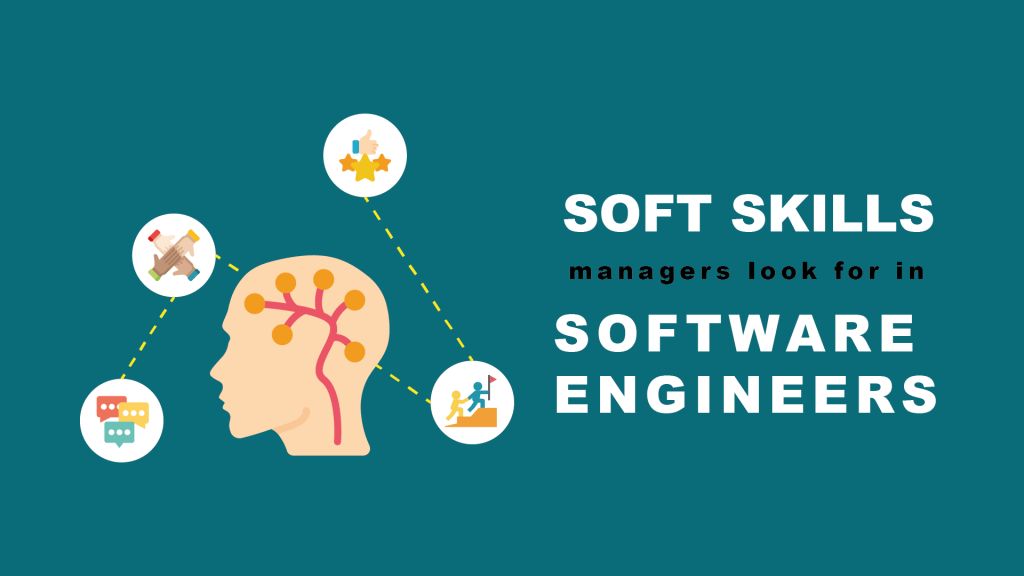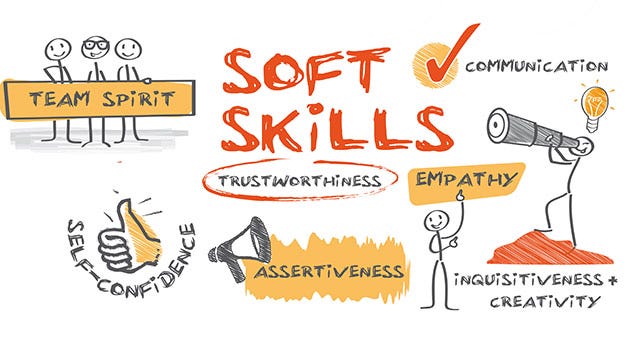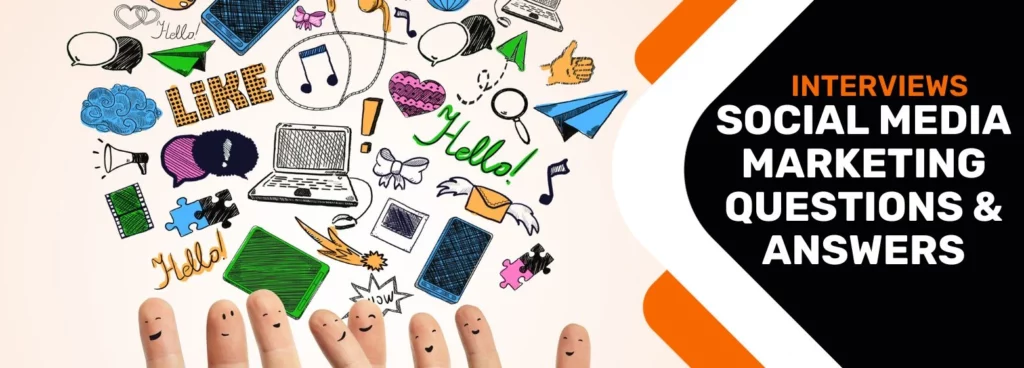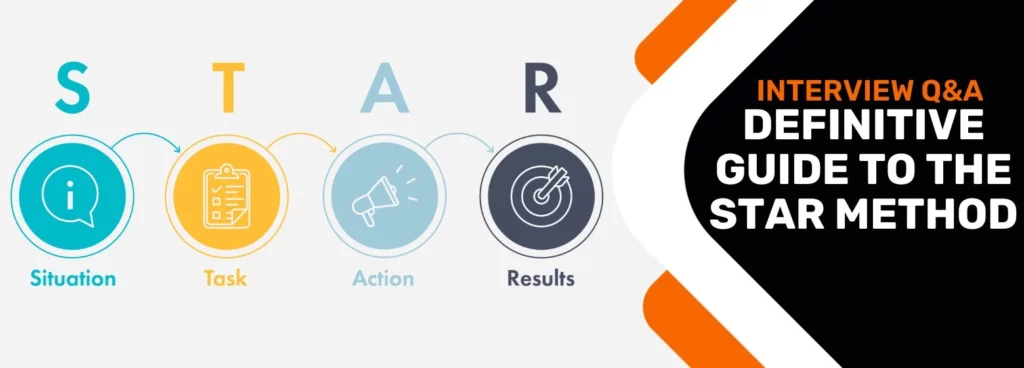Soft Skills that Managers Look for in Software Engineers During an Interview

In an interview, you are usually assessed on a combination of both your technical knowledge and soft skills. However, to validate soft skills, interviewers will usually ask about real-life scenarios and how you dealt with the situation. The inclusion of soft skills-based questions in interviews underscores its importance of it in the corporate environment.
1. What are soft skills?
While possessing the requisite technical knowledge is important for a successful career, soft skills such as assertiveness, innovation, creativity, confidence, and excellent communication skills to express themselves diligently are also a must. The perfect mix of technical and soft skills helps a software engineer to flourish and grow in their career. During an interview, the interviewer is interested in finding out how you solved the problem as this helps them learn about your soft skills. As such, they often do not place as much emphasis on the final result as they do on your thought process.
Now, let us explore the top soft skills and associated interview questions that interviewers are likely to ask.

2. Ability to Communicate
For a software engineer, communication is an essential soft skill. Here’s why it is a critical skill that is sought after so commonly:
Verbal Communication
It is important to be able to express your thoughts clearly and precisely because vague and broken language will confuse people around you. Being an effective communication means that you are able convey exactly what you are thinking to others. Meetings and discussions are a common activity in any project where good communication skills are important to articulate our thoughts properly.
Written communication
Written communication is usually done over media such as emails or documentation e.g. requirement documents. As these media are meant to track or capture important information of projects, without good written skills we risk the loss of information.
Let us have a look at some examples of interview questions related to communication. These questions will help us understand the common questions asked during an interview to assess communication skills.
Examples of questions:
- Tell me a situation when you had to explain a technical aspect of the software to a non-technical person.
- Explain the traits of a good Software Engineer.
- Tell me a situation when you suggested a solution to the management and they outright rejected it. How did you deal with it?
What hiring managers are looking out for:
- Questions are generally open-ended and can be either technical or non-technical.
- In general, there are no right or wrong answers to the questions. The interviewer is looking out for how you put your views/answers across objectively and in a structured manner.
- A good answer would be one that demonstrates a clear and logical approach to problem-solving, and one which adequately reflects your ability to communicate effectively.
3. Team Work
Software development is team work. Having rapport with other team members will help both the organization and yourself achieve growth.
A team player adds positivity to the workplace environment which uplifts everyone around them. Such people are able to easily make new connections and relationships who can help them in their career.
Let us now go through a few interview questions that may be used to evaluate how much of a team player you are.
- How do you ensure that your remote team member communicates well?
- How do you provide positive feedback to a team member who has done a good job?
- Do you prefer to work in teams or independently?
- Have you ever dealt with working with a non-compatible team member? How did you handle it?
What hiring managers are looking out for:
The interviewer is evaluating your interpersonal skills and how comfortable you are working in a team.
Positive traits of the desired candidate are to have a good team spirit, be a great team player, and to have a belief in teamwork. For example, when dealing with a non-compatible team member, a good team player might spend some time walking that team member through to fill up knowledge gaps. Another example of team spirit is when one of the team members has done well, a team player will acknowledge the person’s effort by informing him/her directly or during a group meeting.
4. Confidence
The meaning of self-confidence is to have sound assurance and faith in your own self. You can achieve a grasp on any subject by training, learning, and gaining knowledge. When you have a strong understanding of the topic of the discussion you will rightly feel confident.
For example, when proposing a technical solution to your targeted audiences, doing so in a confident manner would help to better convince them of the efficacy of your proposed suggestions
Let us have a look at confidence-related interview questions-
- How do you decide on choosing Technology A over Technology B for this recent project that you are working on?
- Tell me a situation which shows that your manager had great confidence in you. How did you address the situation?
What hiring managers are looking out for:
- Are you exuding confidence while addressing their questions? Most hiring managers are generally looking for candidates who are able to demonstrate fluency in both their thought process and communication skilks, and who are able to keep calm under pressure. These signs show that you are confident and likely to be a good fit for the organization.
- When you understand a subject well, you automatically tend to have strong self-confidence. So prepare well for the interview!
5. Assertiveness
Assertiveness in this context refers to positively asserting your thoughts without coming across as aggressive. Even if you wish to disagree with another person, it can be done in a polite yet assertive tone. Assertiveness is about being able to put your point across whilst taking into consideration opposing viewpoints.
In assertive communication, we use more ‘I’ statements and not ‘You’ statements.
An example of an assertive sentence is: I feel hurt.
If we use ‘You’ in the same statement, it will come across like we are trying to pin the blame on someone else. Example - You hurt me.

Let us have a look at the assertiveness skills-based interview questions-
- Tell me a situation when you have to be assertive to assign tasks to the team and make them do it.
- Tell me a situation where you had a different opinion from your manager and how did you manage it?
What hiring managers are looking out for:
- How do you handle confrontations and were you able to stay calm during the process?
- Do you get fearful of the thought of proposing an idea to upper management?
A good answer would be one in which you demonstrate your ability to stay calm yet assertive. Stand up for what you believe to be right and aim to arrive at an amicable resolution.
Note: More about assertiveness here.
6. Problem Solving
To solve a problem we need to understand the root of the problem. This requires an analytical mind with decision-making skills.
You may be asked about an incident in which you got into a problem and solved it on your own. This will indicate that you are a problem solver and can work independently.
Let’s have a look at a few problem-solving soft skills related interview questions:
- Tell me a situation when you faced an issue and did not have all the information to deal with it. How did you handle it?
- Tell me a situation when you came to know that you will miss the deadline for delivery. What did you do then?
- Cite a scenario where you got into a technical problem and how you proceeded from there. Did you wait for your seniors to help you or were you able to debug your code/technical scenario on your own?
What hiring managers are looking out for:
- Interviewers are evaluating your ability to gather and analyse data.
- The ideal candidate would be one that possesses the ability to analyze the problem logically and rationally and present possible solutions based on the merits of each.
7. Openness to feedback
Feedback is communication with someone about a task which they have done, to either encourage that or to improve that task. Feedback should be constructive, to improve the overall quality of the task at hand. Acceptance of feedback can be difficult for some people. Constructive feedback can help to make it more receptive such that it is easier to accept.
The ability to accept negative feedback without feeling offended is a trait of openness to feedback.
Let’s have a look at interview questions related to the openness to feedback soft skill:
- Few users provide their feedback on a feature that you have just released that has the worst user experience. How will you react to such comments?
- How do you deal with negative feedback from your manager?
- Do you think feedback helps in improving the performance?
What hiring managers are looking out for:
- The interviewer is looking for how open you are to receiving feedback as well as how well you are able to provide feedback to others.
- How you deal with both positive and negative feedback
8. Creativity
A creative mind is one that is flexible, which can adapt quickly to changes in circumstances and craft viable solutions. Such skills come in handy when a development team faces challenges perhaps due to system architecture. This person will then be able to quickly come out with a workaround so that the team can proceed with development.
Let’s have a look at creative thinking related interview questions:
- How will you react when your team member has suggested an idea which is unorthodox but effective.
- Do you discuss with your teammates the new ways of doing project tasks? Give me an example.
- Tell me a situation when you applied creative thinking to an already existing official process to make it better.
What hiring managers are looking out for:
- They ask about situations about your ability to apply creativity to find solutions to daily activities or complex issues.
- Creativity leads to innovation and that’s why they are looking out for it.
9. Trustworthiness
Trustworthy people are dependable, credible, and they value other people. Therefore clients/customers look for a trustworthy team; managers and organisations look for trustworthy individuals to onboard. They look for dependability and commitment as primary traits.
Within a team, often people look up to a trustworthy senior whom they can trust and share their ambitions.
Similarly, a senior will provide the most challenging responsibility to a subordinate whom the senior trusts the most.
Let’s have a look at the trustworthy skill-related interview questions:
- What would you do when you are asked to do something unethical by your senior?
- Tell me a situation when your commitment to the project was tested?
- Tell me a situation when you failed to meet the commitment. How did you deal with it?
What hiring managers are looking out for:
- Desirable software engineer soft skills are reliable and dependable. They are looking for candidates who follow work ethics, complete tasks within deadlines; and take responsibility with enthusiasm.
- The examples that you choose to answer their questions should show these qualities.
10. Adaptability
Employers want their employees to be adaptive to changes, environment, and technical skills.
In software development, employees need to re-skill and upskill themselves. If a person is resistant to changes they may not be ready to learn new things.
Flexibility, learning capacity, and problem-solving are required traits of an adaptive employee.
Let’s have a look at the adaptive soft skills related interview questions:
- Tell me a situation where you had to work on a task which was out of your role and responsibility
- Tell me a situation where you had to adapt yourself to new software in the project quickly?
What hiring managers are looking out for:
- The interviewer is looking for adjustment in activities and approach if there are changes of any type in the project - team, deadline, software, tasks, etc.
- How quickly you adapt and make positive changes in your attitude is the key to answer these questions.
11. Inquisitivity
It is a tendency to be intellectually curious, to know, and to learn new things.
In the software industry, every other day technology evolves. Therefore all software professionals need to keep up-to-date with the latest technology in the market.
An inquisitive person will learn new technology out of his curiosity and thus will learn better. Also, it is a mindset of wanting to find out more on the information of a project/specifications before getting started. So that a clearer high-level picture is formed before starting the actual project.
Leaders are naturally inquisitive, so that they know more and stay ahead of everyone.
Let us look at inquisitiveness related interview questions:
- What is your learning style and how often you practice it?
- What do you do in your free time outside office hours?
What hiring managers are looking out for:
The interviewer is looking for positive traits- observation, curiosity, learning, passion for various subjects.
Backend Technology Interview Questions
C Programming Language Interview Questions | PHP Interview Questions | .NET Core Interview Questions | NumPy Interview Questions | API Interview Questions | FastAPI Python Web Framework | Java Exception Handling Interview Questions | OOPs Interview Questions and Answers | Java Collections Interview Questions | System Design Interview Questions | Data Structure Concepts | Node.js Interview Questions | Django Interview Questions | React Interview Questions | Microservices Interview Questions | Key Backend Development Skills | Data Science Interview Questions | Python Interview Questions | Java Spring Framework Interview Questions | Spring Boot Interview Questions.
Frontend Technology Interview Questions
HTML Interview Questions | Angular Interview Questions | JavaScript Interview Questions | CSS Interview Questions.
Database Interview Questions
SQL Interview Questions | PostgreSQL Interview Questions | MongoDB Interview Questions | MySQL Interview Questions | DBMS Interview Questions.
Cloud Interview Questions
AWS Lambda Interview Questions | Azure Interview Questions | Cloud Computing Interview Questions | AWS Interview Questions.
Quality Assurance Interview Questions
Moving from Manual Testing to Automated Testing | Selenium Interview Questions | Automation Testing Interview Questions.
DevOps and Cyber Security Interview Questions
DevOps Interview Questions | How to Prevent Cyber Security Attacks | Guide to Ethical Hacking | Network Security Interview Questions.
Design Product Interview Questions
Product Manager Interview Questions | UX Designer Interview Questions.
Interview Preparation Tips
Strength and Weakness Interview Questions | I Accepted a Job Offer But Got Another Interview | Preparation Tips For the Virtual Technical Interview | 7 Tips to Improve Your GitHub Profile to Land a Job | Software Engineer Career Opportunities in Singapore | What can you expect during a whiteboard interview | How To Write A Resignation Letter | Recommendation Letter Templates and Tips.
Quick Links
Practice Skills | Best Tech Recruitment Agency in Singapore, India | Graduate Hiring | HackerTrail Litmus | Scout - Sourcing Top Tech Talent in ONE Minute | About HackerTrail | Careers | Job Openings.





